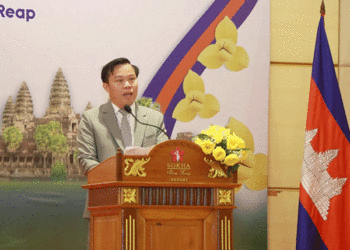VIENTIANE (Xinhua): Laos has been embracing large numbers of Chinese tourists during the five-day May Day holiday, expected to be a strong boost to the country’s tourism sector.
“I observe that the number of Chinese visitors is increasing day by day. I have seen crowds of Chinese tourists walking around the city in the past few days. At that moment, I realized that Laos’ tourism is continuing to rebound,” Namtan, a food vendor in Lao capital Vientiane, told Xinhua on Saturday.
She said that Laos is gaining popularity among domestic and international tourists thanks to reduced travel time and a comfortable ride brought by the China-Laos Railway.
“I think the cross-border passenger service on the China-Laos Railway is the key factor contributing to Laos’ tourism recovery and it brings a lot more Chinese tourists to Laos,” said Namtan.
Meanwhile, the Lao government and tourism-related businesses are making all efforts to raise its tourism standards for more visitors.
“As we all know, almost all businesses and economic activities were shut during the Covid-19 pandemic, and our small business was hit really hard by the pandemic. The return of Chinese tourists brings us hope to recover from the impact of Covid-19,” Khamphanh Somphod, a 41-year-old vendor at a night market in Vientiane, said.
“Based on my personal experience, I can say with confidence that Chinese tourists are high-value customers because they have strong spending power and I believe that more and more tourists are willing to pay for immersive tourism,” he added.
Somwang, a vendor in the Lao capital, said, “Laos has colorful traditions and many scenic attractions waiting for tourists to explore. And I believe that anyone who wants to explore rich natural resources and gather good memories will never be disappointed when spending time in Laos during the holidays.”
Laos’ Ministry of Information, Culture and Tourism has set an ambitious plan for 2024 to attract over 2.2 million domestic and about 4 million international visitors, with an expected revenue of about US$1.3 billion. – XInhua






